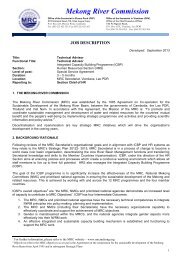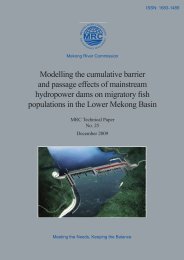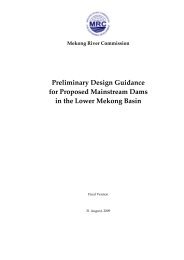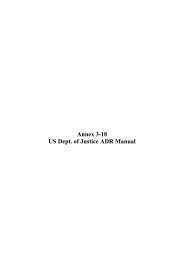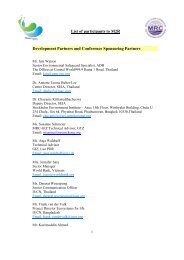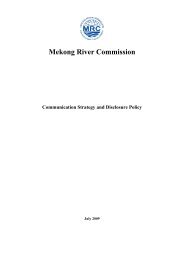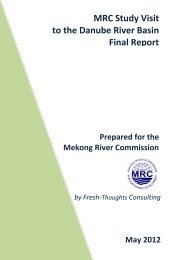Carriage, Handling and Storage of Dangerous Goods along
Carriage, Handling and Storage of Dangerous Goods along
Carriage, Handling and Storage of Dangerous Goods along
You also want an ePaper? Increase the reach of your titles
YUMPU automatically turns print PDFs into web optimized ePapers that Google loves.
80 RECOMMENDATIONS<br />
3.3.3 Management<br />
3.3.3.1 Waste Management<br />
Target group: All barges<br />
RECOMMENDATION<br />
Member Countries should develop a waste management system for h<strong>and</strong>ling waste from vessels.<br />
Challenge<br />
The purpose <strong>of</strong> waste-management plans for ship-generated waste <strong>and</strong> reception facilities is to reduce<br />
<strong>and</strong> eliminate illegal dumping <strong>of</strong> wastes into the river <strong>and</strong> so prevent pollution. Unsatisfactory waste<br />
h<strong>and</strong>ling <strong>and</strong>/or illegal dumping takes place due to inefficient or no waste-management operations <strong>and</strong><br />
a lack <strong>of</strong> control <strong>and</strong> recovery systems.<br />
Ship-generated waste means bilge water, domestic <strong>and</strong> operational waste <strong>and</strong> cargo-associated<br />
waste. The development <strong>and</strong> implementation <strong>of</strong> waste-management plans in ports presents the most<br />
effective means <strong>of</strong> minimising <strong>and</strong> avoiding the potential consequences <strong>of</strong> operational <strong>and</strong> illegal<br />
discharge <strong>of</strong> oil <strong>and</strong> garbage from ships on the aquatic environment. A port waste-management plan<br />
should describe the waste streams <strong>and</strong> h<strong>and</strong>ling routines <strong>and</strong> provide clear instructions for port users.<br />
Waste-reception facilities in Member Countries are limited. These facilities<br />
Figure 16: Wastes Generated Onboard Cargo Vessel (Source: INE WANDA)<br />
should be st<strong>and</strong>ard, operational <strong>and</strong> readily accessible. The cost <strong>of</strong> disposing bilge water <strong>and</strong> other<br />
wastes ashore should be low as additional costs that are too expensive for the shipowner or operator<br />
will result in illegal disposal. Records should be made in an oil record book <strong>and</strong> eventually a cargo<br />
record book (in case <strong>of</strong> cargo residues) that can be inspected by the designated authority.



